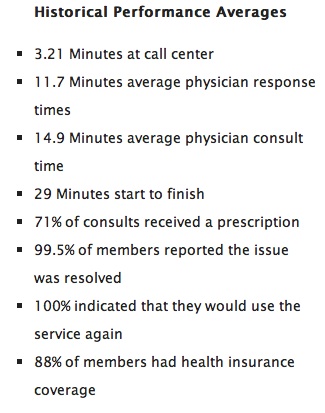 iSelectMD's service by the numbers.
iSelectMD's service by the numbers.
Cellular One, a mobile phone service brand that operates in various rural markets across the US, is now offering its subscribers in Texas and Louisiana on demand, mobile phone-based video visits and calls with physicians. The mobile operator is offering the service through a partnership with Hilton Head, South Carolina-based iSelectMD.
iSelectMD, which was founded in 2010, offers patients access to about 200 physicians who are licensed to practice in seven different states in the US. The physicians field phone calls 24 hours a day from people in need of medical care for non-emergency care, including flu, allergies, respiratory infections, bronchitis, and ear and urinary tract infections. iSelectMD enables patients to connect to doctors via phone calls, bi-directional video, or email.
For Cellular One subscribers in Louisiana and Texas, each call to the doctor will cost $30 and -- conveniently -- will be automatically added to their phone bill. iSelectMD usually offers its services as an add-on to employers' health insurance plans ($2.50 a month per employee) and then employees typically pay $25 per consultation with a doctor. The Cellular One offering only requires the fee for each call.
Cellular One didn't broker the deal with iSelectMD on its own. Last November the Competitive Carriers Association (CCA), which is an industry group for smaller mobile operators -- basically everyone but AT&T and Verizon Wireless -- partnered with iSelectMD to bring its mobile health service to its association members. Cellular One is the first mobile operator to take advantage of the deal. Both Sprint and T-Mobile USA are also a part of CCA -- but iSelectMD's service is not yet available nationwide so a deal with national mobile operators is unlikely any time soon.
The big mobile operators in the US have largely shied away from direct-to-consumer mobile health services in favor of the B2B opportunities around medical device connectivity, health information exchanges, security and authentication services, and tools for health developers. Both Verizon and AT&T have mPERS offerings in the works now. Verizon Wireless sees remote monitoring and home health as an opportunity -- it recently announced FDA clearance for a telehealth hub device. While it has lost a number of members of its mHealth team in the past year, AT&T did just announced Dr. Eric Topol was its new Chief Medical Advisor. It's clear the nationwide mobile operators still have big plans for digital health.
While mobile operators in the US have been reluctant to offer branded health services to their subscribers in the US, it is more common in Europe. One promising direct-to-consumer rollout was in the UK, where O2, a subsidiary of Telefonica, had launched an mPERS offering for its subscribers and a home health patient monitoring service. O2 launched the D2C versions of these offerings last March and announced plans to shut them down just a few months later in July.



















